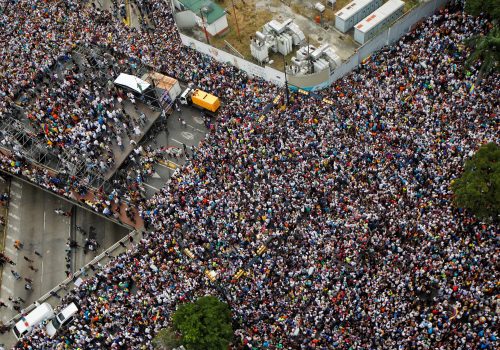English
Español
Event Summary
On January 31, 2020, the Adrienne Arsht Latin America Center hosted a discussion on the Maduro regime’s connections to terrorist organizations and irregular groups, and what the international community can do to prevent and combat this threat more effectively. Diego Area, the Associate Director of the Adrienne Arsht Latin America Center, began the event by providing background information on Hezbollah and its historical ties to the region. Area then introduced Vanessa Neumann, the Venezuelan interim government’s Ambassador to the United Kingdom and Ireland; and Carlos Paparoni, Representative of the Regional Office against Money Laundering and Corruption of Venezuela’s National Assembly. The panel discussion began with a brief presentation by Representative Paparoni, who provided evidence of the relationship between the Maduro regime and Hezbollah, the National Liberation Army (ELN) and dissidents of the Revolutionary Armed Forces of Colombia (FARC). Paparoni explained how the regime has forged passports that give legitimacy to people and organizations known to work with Hezbollah and the FARC. Only two out of every seventeen passports authorized are legitimate, according to Paparoni. The rest, he said, are falsified documents for members of these terrorist organizations. Representative Paparoni ended his presentation by stating that the Maduro regime’s corruption provides financial support to irregular groups.
Area then asked Dr. Neumann to speak about the reach and interests of Hezbollah in Latin America. She dated the connection back to 2003, when Iran and Venezuela first signed strategic agreements. Dr. Neumann also noted the role of the Middle East exodus and how radicalized Hezbollah emigrants found kindred mentalities within the FARC and Chavistas. She emphasized how the institutional fragility of Venezuela has made it a fertile ground for irregular groups to grow.
Speaking on the role international actors can play in the fight against terrorism, Dr. Neumann announced that the government of the United Kigndom, in collaboration with Guaidó’s interim government, is launching a finance intelligence commission to combat illicit financial networks in Venezuela. She called on more governments to launch similar initiatives, as well as to implement sanctions against individuals who facilitate Maduro’s illicit commerce.
On the same topic, Representative Paparoni noted that quick action is necessary to address the Maduro regime’s criminal nature, and argued that applying both financial and diplomatic pressure would be most effective. Dr. Neumann added that a multilateral approach would give Guaidó’s government the best chance it has to defeat Maduro’s regime and his allies.
Area then opened the floor for questions from the audience. On the absence of sanctions on airlines and other organizations that abet Maduro’s criminal trade, Dr. Neumann stated it is the responsibility of the interim government to request those sanctions from allies. With regards to asking assistance from the European Union, Dr. Neumann acknowledged the political limitations due to an absence of urgency on the part of Europe when it comes to Venezuela. Representative Paparoni lauded the United States Department of Treasury’s hard work, but said, “Maduro is committing the largest terrorist financing scheme in the history of this continent, and action must be taken soon.”
Responding to a question of conspiracies around the Venezuelan exodus, Dr. Neumann argued that there are indeed intentional actions to build xenophobia against Venezuelans and that discrimination decreases the willingness of international allies to assist Venezuelans and the interim government. She added, however, that the exodus itself is a story of repression, desperation, and hunger.
Area closed the event by commenting on the threat that these irregular groups pose to Venezuela, the US, and globally. He called the Maduro regime a “multidimensional adversary,” and reminded everyone that triumph in Venezuela requires a unified, international effort.
At the III Regional Conference Against Terrorism, held in Bogotá, Colombia last week, leaders from Latin America and the United States condemned the Maduro regime for its links to terrorism and irregular groups. While the Venezuelan people struggle without access to food and clean water, the Maduro regime is providing money, support, and weapons to groups like Iran-backed Hezbollah, as well as the National Liberation Army (ELN) and dissidents of the Revolutionary Armed Forces of Colombia (FARC). As part of its efforts to condemn the regime’s connection with irregular groups, interim president Juan Guaidó recently appointed Carlos Paparoni as representative in the National Assembly’s Office of Regional Cooperation against Money Laundering and Corruption.
How have ties to terrorism benefited the Maduro regime? How can the international community offer strategies to prevent and combat the threat of international terrorism and organized crime more effectively? Join the Atlantic Council’s Adrienne Arsht Latin America Center on Friday, January 31 from 9:00 to 10:00 a.m. (EST) for a discussion on the role of irregular armed groups in Venezuela and how to strengthen international cooperation and its effectiveness in the fight against terrorism.
Panel Discussion
Carlos Paparoni
Representative of the Regional Office against Money Laundering and Corruption; National Assembly Representative
Bolivarian Republic of Venezuela
Vanessa Neumann
Ambassador to the United Kingdom and Ireland
Interim Government of Venezuela
Moderator
Diego Area
Associate Director, Adrienne Arsht Latin America Center
Atlantic Council
